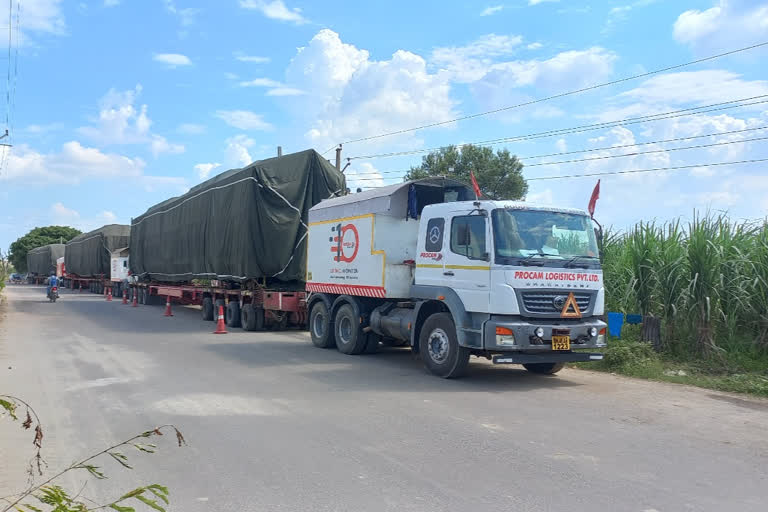New Delhi/Ghaziabad: Six coaches of the Regional Rapid Transit System (RRTS) reached the Duhai Depot in Ghaziabad on Monday for upcoming regular operations in Uttar Pradesh. The first trainset of Rapid Rail reached the Duhai depot in Ghaziabad on June 12. The coaches were brought by road on separate trailers from the manufacturing factory in Savli of Gujarat.
The train coaches reached Duhai Depot from Savli in Gujarat via Rajasthan and Haryana. The coaches of the train will be lowered with the help of a crane and in the coming days, this entire train will be assembled in the depot itself. The National Capital Region Transport Corporation (NCRTC), the joint venture of the Government of India and the states of Uttar Pradesh, Haryana and Rajasthan tied up with M/s Alstom to make trainsets of RRTS under which M/s Alstom will deliver 40 trains, including 10 three-coach metro trains for Meerut Metro.
Also read: Part of Delhi-Meerut RRTS train service to start operations in March 2023
Of these, there will be 30 six-coach RRTS trains. Along with the construction of the trains, Alstom will also be responsible for the maintenance of these trains for the next 15 years through an Annual Maintenance Contract (AMC). The NCRTS is working to meet the target of running the country's first RRTS train by March 2023 on the priority section of the Delhi-Ghaziabad-Meerut Regional Rapid Transit System (RRTS) corridor. After successful trials, there is a pre-operational trial scheduled before the regular operations. A major part of 68 km of the 82 km long Delhi-Ghaziabad-Meerut RRTS corridor falls in Uttar Pradesh, while a part of 14 km is in Delhi. The 17 km long priority section has Sahibabad, Ghaziabad, Guldhar and Duhai RRTS stations and Duhai depots.
The key features of RRTS trains include an aerodynamic profile to reduce air drag at high speeds, ergonomically designed 2X2 transverse seating, cushioned seats with overhead luggage rack, one 'Premium Class Car' in each train, a coach reserved for women, CCTV Surveillance, Modern Passenger Announcement and Digital Passenger Information System (PAPIS), Wi-Fi and onboard infotainment, USB port on each seat for mobile charging, wheelchair space for the disabled and a stretcher for emergency medical transport. The Delhi-Ghaziabad-Meerut RRTS corridor is expected to reduce carbon dioxide emissions by about 2,50,000 tonnes per year. The regular trains are to be operated on this entire corridor by 2025.



